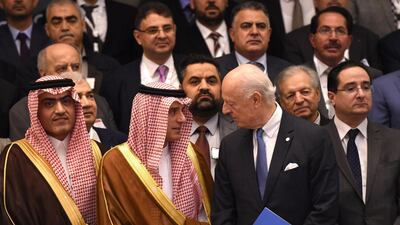The Russian president said on Wednesday a “new stage” had been reached in the Syria conflict but achieving a political solution would require compromises from all sides, including the Syrian government.
Vladimir Putin's remarks came as he hosted a meeting with Hassan Rouhani, the Iranian president and the Turkey leader Recep Tayyip Erdogan in the Black Sea resort of Sochi.
The Russian leader said after the meeting that they had agreed to a "congress" of Syria's regime and opposition forces to discuss "the parameters of the future state." He added that the congress would be "a stimulus for activating the efforts for Syria regulation in the framework of the Geneva process."
The meeting in Sochi was aimed at resuscitating the peace process in Syria and comes two days after Mr Putin hosted Syrian president Bashar Al Assad in a rare visit outside of his ravaged country.
Mr Putin said a political settlement in Syria will be finalised within the frameworks of UN peace talks in Geneva. The Russian president is encouraged by military successes of the Russian and Syrian forces against rebel groups and ISIL and is hoping to breathe new life into the stuttering negotiations.
"What happens in Geneva, and Riyadh, will depend on what happens in Sochi," Andrew Parasiliti, director of the RAND Center for Global Risk and Security told The National.
“Russia, Iran and Turkey are an uneasy alignment, their interests are not a perfect match, but the Astana process, which they are driving, is nonetheless setting the pace for the winding down of the Syria war," he said.
The Russian president stressed "the militants in Syria have been dealt a decisive blow and a real chance has appeared to bring an end to many years of civil war”. He added that a political settlement in Syria is now the “strategic task.”
“Putin is seeking to move from the military to political track in Syria, but can he get there? There are still some hurdles,” Mr Parasiliti said. “There is the coming battle for Idlib, where Al Qaeda’s Syria affiliates and allies and other radical armed groups have taken hold, as well as whether Turkey will consider military action in Afrin or elsewhere against the People’s Protection Units (YPG).”
For many years, Western and Arab countries backed the opposition demand that Mr Al Assad leave power. However, since Russia joined the war on behalf of Mr Al Assad's government three years ago, Damascus has recaptured all of Syria's major cities from anti-Assad rebels, making it increasingly clear that Mr Al Assad's opponents have no path to victory on the battlefield.
Meanwhile, members of the Syrian opposition gathered in the Saudi capital for a meeting that intends to outline a unified vision ahead of UN peace talks in Geneva.
Syrian opposition groups will stick to their demand - that Mr Al Assad leave power at the start of any political transition - despite speculation they could soften their position in light of the government's strength on the battlefield.
The opposition is divided on several other key issues including the length of any political transitional period and a constitution that will see the country move toward elections.
During the Riyadh conference on Wednesday, the United Nations envoy for Syria, Staffan de Mistura, urged opposition groups to unify ahead of the UN talks starting Geneva next Tuesday.
Mr De Mistura said the aim was "to give momentum to next week's talks in Geneva by forging a unified opposition delegation, as long demanded by the Syrian government".
The envoy said he would be pressing hard for real negotiations on a new constitution and UN-supervised elections "all in the context of continuing to work on a credible, all-inclusive, non-sectarian governance and on combating terrorism".
"We will also press — and we will never give up — on the issue of the appalling plight of detainees, abductees and missing persons — and on full humanitarian access in any besieged area or hard-to-reach-area including, these days, Eastern Ghouta," he added.
_________________
Read more:
Putin urges political solution in Syria in calls to Trump, Middle Eastern leaders
Editorial: The perpetuation of Bashar Al Assad's rule is an insult to Syrians who have suffered under him
Syria military operation 'wrapping up', Putin tells Al Assad in Russia
_________________
Mr De Mistura said he would travel to Moscow on Thursday for talks with Russian officials, adding: "I'm always optimistic … especially in this moment."
The 140 or so delegates meeting in Riyadh — who represent a wide range of opposition platforms — are under heavy pressure to row back on some of their more radical demands after a series of battlefield victories in recent months has given the Syrian regime the upper hand.
Saudi foreign minister Adel Al Jubeir told delegates on Wednesday that a solution to the crisis in Syria could only come about by consensus.
"There is no solution to the crisis without a Syrian consensus that would achieve the demands of the Syrian people on the basis of Geneva 1 and UN security council resolution 2254," Mr Al Jubeir said.
Some of the opposition delegates are backed by Gulf countries, who have supported the rebels in Syria's conflict, while others have been backed by Russia, the Syrian regime's main ally. One of the opposition groups present on Wednesday is backed by Egypt, which has kept contacts with the Syrian government.
The conflict in Syria, now in its sixth year, has all but frozen amid a series of ceasefires. But a political solution has long been elusive.


